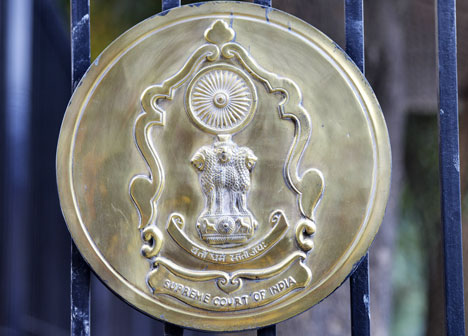The Supreme Court has ruled that family members of a person killed in a road accident should be awarded a “just compensation” apart from pension, provident fund or accrued insurance amounts the deceased was in any case entitled to.
“Any method of calculation of compensation which does not result in the award of ‘just compensation’ would not be in accordance with the (Motor Vehicles) Act (of 1988),” Justice Deepak Gupta, writing the judgment for the three-judge bench, said.
“The word ‘just’ is of a very wide amplitude. The courts must interpret the word in a manner which meets the object of the act, which is to give adequate and just compensation to the dependents of the deceased.”
Pension and gratuity are more in the nature of “deferred wages”, the court added, while insurance amounts were benefits of wise investments.
The recent ruling came as the bench — that also included Justices Madan B. Lokur and Abdul Nazeer — awarded a total compensation of Rs 50 lakh to Sebastiani Lakra and other family members of a man killed in a road accident in Odisha.
The bench set aside a ruling of the state’s high court that had reduced the compensation to Rs 36 lakh from the Rs 40.9 lakh the Motor Accidents Claims Tribunal had awarded.
The high court had reduced the compensation on the ground that the family was getting Rs 50,082 a month under the Employees Family Benefit Scheme from the company where the deceased worked.
The top court rejected the high court’s contention, saying Section 168 of the Motor Vehicles Act mandated that “just compensation” should be paid to claimants in a road accident case.
“One must also remember that compensation can be paid only once and not time and again,” the bench said.
The court said it was a well-settled law that amounts received by a person's legal heirs by way of provident funds, pension and insurance could not be termed “pecuniary advantage” liable to deduction.
“The main reason is that all these amounts are earned by the deceased on account of contractual relations entered into by him with others,” Justice Gupta said. “It cannot be said that these amounts accrued to the dependents or the legal heirs of the deceased on account of his death in a motor vehicle accident.”
As for any amount paid under any insurance policy, the bench said, it is not because of the death of the deceased but because of the contract that person had entered into with the insurance firm.
“The deceased paid premium on such life insurance and this amount would have accrued to the estate of the deceased either on maturity of the policy or on his death, whatever be the manner of his death. These amounts are paid because the deceased has wisely invested his savings. Similar would be the position in the case of other investments like bank deposits, share (and) debentures, etc.,” the court said.
The bench said pension and gratuity are paid on account of the service the deceased had rendered to his employer. “These amounts are also payable on death,” it said.











